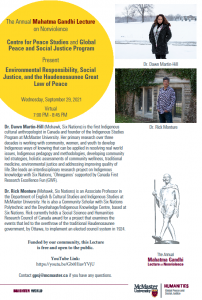Annual Gandhi lecture to explore themes of Truth and Reconciliation with Indigenous communities

Researchers Dawn Martin-Hill and Rick Monture will speak about environmental responsibility, social justice and the Haudenosaunee Great Law of Peace in the 2021 Mahatma Gandhi Lecture on Nonviolence.
This year’s annual Mahatma Gandhi Lecture in Nonviolence will feature McMaster researchers Dawn Martin-Hill and Rick Monture, speaking about the Haudenosaunee Great Law of Peace and its relationship to Gandhi’s teachings, environmental responsibility and social justice.
Martin-Hill, a cultural anthropologist who is Mohawk, Wolf Clan, is one of the original founders of the Indigenous Studies program at McMaster. Among many other projects, she is working with a large multidisciplinary team to improve access to clean water and increase capacity in water monitoring both in her community of Six Nations of the Grand River and for the Lubicon Lake Cree Nation in Alberta.
Monture is Mohawk, Turtle Clan, and is an associate professor in the department of English & Cultural Studies and the Indigenous Studies program.
He is the recipient of McMaster’s 2021 Indigenous Scholar-in-Community fellowship, which will allow him to work with the Woodland Cultural Centre in Brantford to interview, record and document the cultural wisdom and stories of first-language speakers of Cayuga and Onondaga.
 The lecture runs in tandem with the Gandhi Peace Festival, which is held in Hamilton each year on the weekend closest to Gandhi’s birthday, Oct. 2. The theme for both the festival and the lecture this year is “Truth and Reconciliation with Indigenous communities.”
The lecture runs in tandem with the Gandhi Peace Festival, which is held in Hamilton each year on the weekend closest to Gandhi’s birthday, Oct. 2. The theme for both the festival and the lecture this year is “Truth and Reconciliation with Indigenous communities.”
“The theme is chosen to reflect ongoing concerns in the world and in our community,” explains Chandrima Chakraborty, director of McMaster’s Centre for Peace Studies, which coordinates and hosts the lectures. “In a year where there have been numerous stories about the remains of Indigenous children found on sites of former residential schools, we have a responsibility to listen and learn, and then take action to hold our government, our institutions and ourselves accountable for the ongoing injustices faced by Indigenous peoples in Canada.”
The Great Law of Peace united the original five nations of the Haudenosaunee Confederacy under a single “constitution” – a collection of guidelines brought by the Great Peacemaker that stopped ongoing warfare between the Mohawk, Cayuga, Onondaga, Seneca and Oneida nations. The Tuscarora peoples became the sixth nation in the Confederacy some time later.
In its essence, explains Monture, the Great Law models a way to live with each other, and with the land, in peace.
“Our ancestors tried to model a way of thinking and understanding that humans are frail and prone to make mistakes – but others, who are of a good mind and have clear thinking in a situation, have to lead the way and model good behaviour,” he says.
“The Peacemaker wanted us to focus our collective energy on transforming the handful of bad-thinking people in the world, rather than meeting violence with violence. There’s a grounding of our behaviour on the land, and from that land, and that’s important to remember – not to take from it, not to desecrate or damage it, but learn from it.”
Martin-Hill points out that Gandhi’s teachings mirror many elements of the Great Law.
“Our people have a solid understanding that our thoughts will manifest in our actions, as did Gandhi — those ideas come from the same core of peace, which is peace through communication and allyship,” she explains.
“Those concepts are important in Gandhi’s work, as is decolonization, although he didn’t call it that. He would have recognized our struggle to find self-governance, self-sufficiency and autonomy, but also not meeting violence with violence. In the spirit of decolonizing and peacebuilding, the Great Law of Peace is our ‘Gandhi-ism’ – there’s synergy between our philosophy and what Gandhi taught.”
The annual Mahatma Gandhi Lecture on Nonviolence will be held virtually on Wednesday, Sept. 29 at 7 p.m. For details, including the Zoom link for the event, go to the Faculty of Humanities event calendar.


